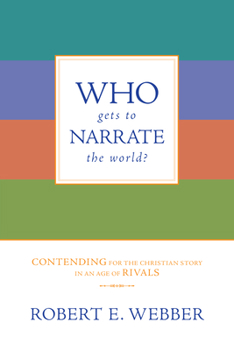Who Gets to Narrate the World?: Contending for the Christian Story in an Age of Rivals
Select Format
Select Condition 
Book Overview
Christianity in America will not survive in our age unless it is fully rooted in the Gospel. Convinced that American evangelicals are facing the demise of their entire way of life and faith, the late Robert Webber challenges his readers to rise up and engage both the external and internal challenges confronting the church today.
Format:Paperback
Language:English
ISBN:0830834818
ISBN13:9780830834815
Release Date:April 2008
Publisher:IVP
Length:137 Pages
Weight:0.40 lbs.
Dimensions:0.4" x 5.6" x 8.2"
Customer Reviews
5 ratings
A story to live in
Published by Thriftbooks.com User , 14 years ago
It is ironical when people say they have no religion, and that religions should be banned from the public domain. Because there is no neutral ground. We all seek to make sense of the world as we see it. That is the peculiar fate of the human being. Even the newborn is a centre of awareness trying to process the environment into which it has plummeted. Each of us develops an internal narrative which outruns, and always will outrun, the evidence available to finally clinch its claim to truth - at least this side of death. And each of us is to some extent influenced, in the evolution of our own story, by the stories of others. This is particularly so in regard to the big picture stories generated by the major religions, and by philosophers who pour scorn on them. Since all persons embrace by faith certain ultimate bets on what is the ultimate nature of the reality they inhabit, we are correctly described as "homo religiosus", even those who deny the ascription, such as scientific humanists. It is therefore entirely in order to ask, as Robert E. Webber does, "Who gets to narrate the world?' In this relatively small book, Webber packs a closely reasoned argument that societies tend to be dominated by particular big picture stories. He deftly leads us through the narratives, or world-view accounts, of early Christianity and the pre-Christian European era. He then goes on to show how the Judaic and Christian stories became dominant in the West. Then he tracks "how the West lost God's narrative", yielding to a dominant Modernism which rode in on the back of scientific discovery. This in turn has been contested by trends he describes as Postmodern, post-Christian, and Neopagan, with additional contenders challenging these as well, notably Radical Islam. The final substantive chapter sounds "A Call to an Ancient Evangelical future" aimed at helping Christians to regain the ideological initiative through a return to the robust story of God's decisive action, as set down in the early centuries of the church's development. Webber writes as a thinking Evangelical Christian, though he is quite prepared to deplore the comfortable, privatised narrative which often disfigures the Evangelical tradition, particularly in affluent, middle-class America. His analyses of the various stories are clear and pithy, providing a readable summary which would be ideal as a backdrop for a series of seminars in a church or seminary, using this book as primary background reading. It would be a fine conversation starter in wider circles too. For me, it has drawn together many threads of cultural and theological analysis that have been exercising my own mind, and I commend it to anyone seeking to chart a course for Christian thought and action through the tangle of stories competing for dominance in the modern world.
Who Gets to Narrate the World?
Published by Thriftbooks.com User , 15 years ago
"A good book tells about the narration. The content is concise and thorough. A worth reading & collect."
A Sobering Book
Published by Thriftbooks.com User , 16 years ago
This is truly a sobering book by Robert Webber, written at the very end of his life, with all his keen insight into history and theology. Webber died from pancreatic cancer shortly after he finished the book and before it was published. Otherwise, he would no doubt be a target for radical Islamic extremists, as he speaks the truth about this very real threat to a Christian world view. The other threat he identifies is cultural accommodation, comparing modern America with the Roman Empire, which fell from within due to it's moral decadence, philosophical relativism and religious pluralism. Webber's call to relearn the Christian narrative and break away from our accommodation to culture is something Christians need to hear and embrace.
Who Gets to Narrate the World
Published by Thriftbooks.com User , 16 years ago
The book came in excellent condition and in good time. The price was right. Thanks for carrying it.
Great approach to one of the most significant issues of our time
Published by Thriftbooks.com User , 16 years ago
Another insightful treatment of one of postmodernism's most important issues by my late mentor. Brief, direct, and powerful--well worth the very little time it takes. Bob's treatment of the nature of Islam and its active attempt to supplant all comers to the battle for truth is the best I've read to date. Reminds me of his little known but skillful collaboration with Rodney Clapp, The People of the Truth. A must read for the people of Christ and the new creation!





